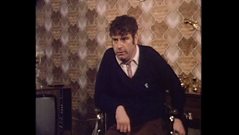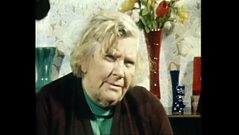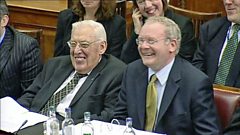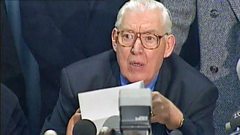
Catholic perspectives following the 1981 hunger strike
Reporter Mike Dornan assesses the legacy of the 1981 hunger strike on the Catholic community in Northern Ireland. He speaks to Fr. Des Wilson a community priest in the Ballymurphy estate in West Belfast and Paddy Devlin a Belfast City councillor.
Mike Dornan begins his report on the impact of the 1981 republican hunger strike in the Maze by stating that hunger strikes have played a powerful role in Irish politics. He suggests that the republican movement took a calculated gamble with the recent hunger strike believing it would do what their military campaign has failed to do: unite the Catholic community behind their cause. Dornan believes the hunger strike had more to do with winning the hearts and minds of the Catholic people than conditions in the prison and wonders how much of that support has survived the strike. To assess the situation he speaks to Fr. Des Wilson a community priest in the Ballymurphy estate in West Belfast and Paddy Devlin a Belfast City councillor.
Fr. Wilson believes the hunger strike has brought about the biggest political change that has taken place in his life time: it has radicalised the electorate. People now realise that the Westminster model that governs British people is not adequate for the needs of the people in Northern Ireland.
Mike Dornan, tells us that Paddy Devlin has suffered badly at the hands of republicans for speaking his mind. Republicans forced him from his Andersonstown home where he and his family had lived for 17 years. In the 1981 council elections he narrowly retained his seat. He stood as a Socialist. Devlin says pressure was put on councillors to withdraw from normal political issues and focus instead on the demands of the H-Block campaign.
Devlin says the hunger strike has polarised politics in Northern Ireland and believes Protestants are upset by the Provisional IRA’s involvement in politics. He’s referring to the two Fermanagh-South Tyrone by-elections when hunger striker Bobby Sands won the seat in April 1981 and which Owen Carron subsequently won in a further by-election in August 1981. However, he believes that the republicans’ electoral success will recede. The ending of the hunger strike has created a political vacuum for republicans. The Catholic establishment in Ireland i.e. the SDLP, the Catholic hierarchy and the Irish government, are now fighting back.
Fr. Des Wilson says West Belfast does not have the calibre of politician capable of answering the kind of questions their electorate are asking. The politicisation resulting from the hunger strike has been so deep that they would need a tremendous political intelligence which cannot be found among established political leaders. He says the republican movement (he’s not talking about the IRA) has won a major victory in capturing the minds of the people. He suggests that a politician who says he’ll ask a question in the House of Commons is not likely to be successful in any future election in West Belfast. He contrasts raising a question in the House of Commons with the raw power generated by the hunger strike which brought tens of thousands of people onto the streets. Getting 30 thousand people out to vote is real power, he says.
Dornan asks Devlin if he thinks republicans would be successful in winning West Belfast if there were an election soon. Devlin makes a distinction between urban and rural voters and suggests that republican success in Fermanagh-South Tyrone does not mean they could win West Belfast. He believes that given time the sitting MP Gerry Fitt could recapture his vote and win the seat. Dornan is not convinced. He believes it will be hard political ground to win back.
Dornan asks Fr. Wilson how he feels the Protestant community viewed tens of thousands turning out for Bobby Sands’ funeral. Fr Wilson says he hopes they will take notice of the powerful movement that has emerged from the death of Bobby Sands and the other hunger strikers. He says Catholics and Protestants should sit down together and think about the institutions of government they’ll require in the future. Fr. Wilson accepts that Protestants feel frightened but he says Catholics feel frightened too. He believes both communities need new political ideas and these are coming not from traditional politicians but from the republican movement and the UDA (Ulster Defence Association). He believes that when historians look back they will say that the hunger strike marked the beginning of the end of Westminster rule in Ireland.
Duration:
This clip is from
More clips from After the Hunger Strike
-
![]()
Loyalist perspectives following the 1981 hunger strike
Duration: 07:05
-
![]()
Mother takes her son off hunger strike
Duration: 03:30
More clips from Spotlight
-
![]()
Hamza and Salam's escape—29/09/2015
Duration: 01:59
-
![]()
A Long Way from Clare to Here—29/09/2015
Duration: 02:25
-
![]()
Paisley and the Good Friday Agreement—Paisley and the Pretender
Duration: 02:13







